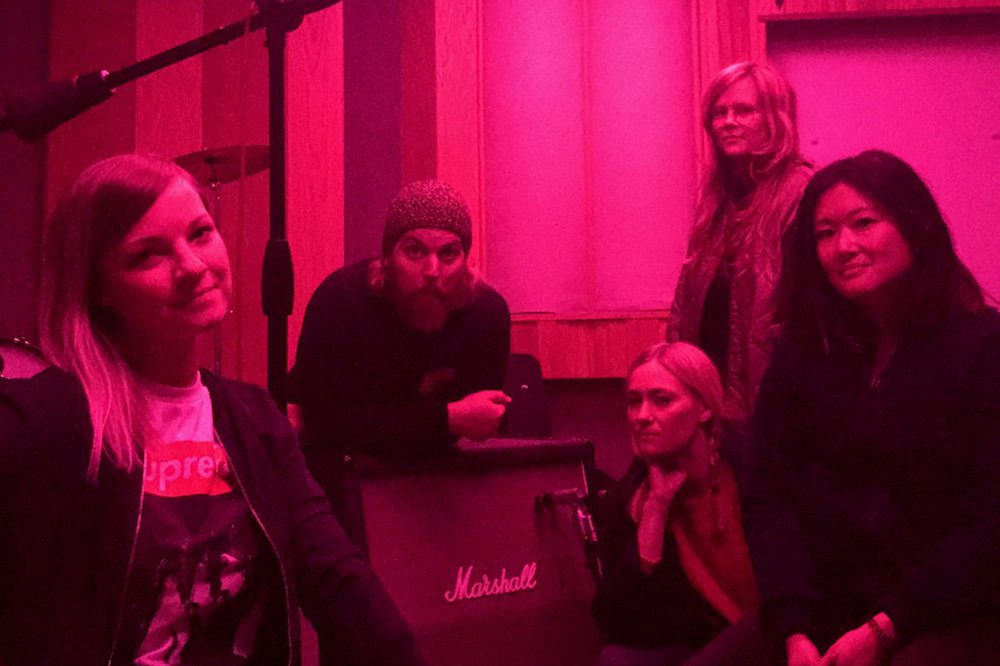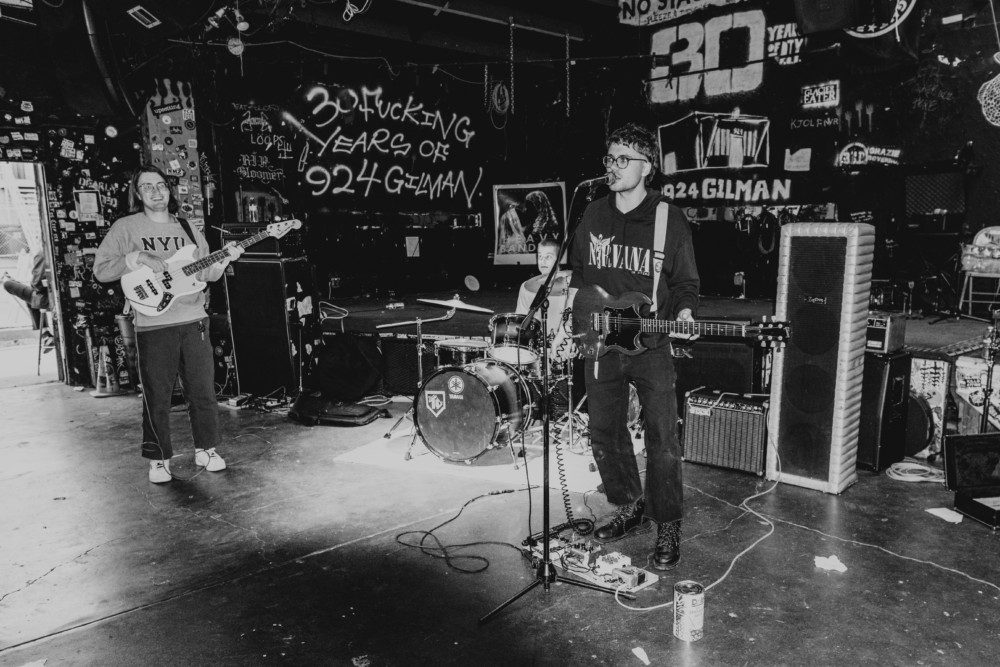

“Because I’m really honest, I get really honest reactions from the audience,” says Kelsey Ferrell, who makes music as the Berkeley/Santa Cruz-based Feral. Her music is, if anything, brutally honest. Feral’s most recent release, a four-song collection of demos recorded on a earbud microphone, slaps us with this unforgettable line halfway through the first song, “Native Speaker”: “I know I am a total mess/and my songs don’t pass the Bechdel test.”
For someone who was involved quite closely with social justice both personally and professionally throughout her undergrad career at UC Berkeley (she recently graduated), you would think such an admission would more likely be held hostage in some unmarked folder in GarageBand on Ferrell’s laptop as opposed to being broadcasted to the world on Bandcamp. But this, frankly, never seemed like a consideration for Feral, who appreciates above all how her openness can potentially manifest as a balm for others. “I’ve had people come up to me after I’ve performed [a song] and said, ‘wow, that really meant a lot to me,’” she explains. “And that kind of moment of having someone connect to my music — it’s worth it to me. It makes it worth the vulnerability on my side.”
And the music is better for it. It can be difficult to rehash traumatic experiences to a trusted friend, let alone an audience looking for levity (Ferrell does stand-up comedy as well) but she seems to have settled in the knowledge that the only way out is through. One such foray into the weeds for Ferrell is her reckoning with a past relationship that had a huge impact on her. “I have a few other songs that are maybe about a fling here and there, but he is the main person I write about,” she says. “There’s just so many interesting elements to our relationship that made it not a normal relationship and not a normal breakup. So it just it has a wealth of metaphors and storytelling [to pull from].”
Said ex-partner makes an appearance in three out of the four songs on “Quarantine Demos,” in ways both tragic and sweet. “Native Speaker” is at once both forlorn and determined in its assertions as Ferrell laments the loss of the person who helped her discover and define herself as a sexual partner: “Cause you and I wrote our language of love together/and you are the one/and I’m missing the tongue/of my native speaker,” she sings.
Considering that first times and first loves are often dismissed for their sloppy and adolescent bent, it’s refreshing to hear someone admit that this was not be-all-end-all of their experience, even as those feelings resurface from time to time. Furthermore, the expectation that suffering is inherent to our first forays into sex — especially for women — is an exhausting trap that feels good to shake off, even if tinged with loss. “Forlorn and determined” is also, incidentally, not a bad way to describe Ferrell’s voice, which is very strong, switching with ease from a tongue-in-cheek indie-pop delivery to some arresting ethereality.
The destructive power that one individual can hold over you is a predominant theme in Demos, as well as Ferrell’s 2018 LP debut, Trauma Portfolio, which also details the complexities of that formative relationship. “I was dating the son of a billionaire,” she explains, “and I was growing increasingly uncomfortable with that relationship and the ways it made me complicit in oppression… it just brought in this huge power dynamic to our relationship. Even though he didn’t necessarily abuse that power or want to hold power over me, he just intrinsically did.”
Despite her discomfort with dating “the 1% of the 1%,” Ferrell is eager to turn the spotlight back on herself, noting, as she puts it, her own hypocrisy. “I think that a lot of my earlier songs were casting the blame here and casting the blame there and not really looking at myself and how I might have been a part of the problem,” she says. The penultimate track of Demos, “Titanic,” is a great example of how far she’s come: “I am so broken that I call upon God,” she admits in the chorus. “I do not believe but I want to be wrong/You’re my delusion, my sad fantasy/I cannot hold you, but you’re all that I see.” It is both condemnation and consternation at once, the three-minute version of those moments where you look at yourself in the mirror and ask: How could you do this to me? But more importantly — how could I do this to me?
Trauma Portfolio is slim at nine tracks but feels much more substantial despite its focus on a central subject matter. Back on the subject of personal responsibility, Ferrell notes the yin and yang of her album, also known as tracks seven and eight. The former, “Fuck the Bourgeoisie,” is both utter fun and utter horror, as Ferrell’s self-deprecating denouncement at the end of the chorus (“I did, I did!”) lets us know on no uncertain terms the depth of the mire she was at the time of the song’s germination, if not its final cut. Rectifying your judgement of others with your own bullshit is, at the very least, a Herculean task, one which she throws herself into with resigned grace in the “Supertragic,” which follows. It’s a bit of a self-flagellation exercise, where every insult Ferrell parrots back in the chorus (“also rich, hypocrite/vendetta vixen, biased bitch”) sounds like less of a kiss-off and more of a panicked question to no one. Is it true?
The true kiss-off comes in “Soup,” a pissed-off anthem with some pretty relatable grievances – if some very unusual circumstances – that brought them about. The song details Ferrell’s experience as a high school senior after she was labeled a snitch for attempting to get the authorities involved in an underage student’s relationship with an older man. “I was bullied and shunned and all of these terrible things that entire year… I basically was thrown under the bus by these adults who were supposed to protect me,” she explains. “And something that [the other kids] did was they came to my boyfriend’s house and they, like, body slammed him with cans of soup.” Anyone who has found themselves at the crosshairs of the mob will find something to relate to here, whether it be some very justified calls outs of the cops and school administration or simply this salient line: “Fuck the apologists who think it’s okay/And love to all of my snitches and bitches who stand up for the same.”
The events chronicled in “Soup” were the beginning of the end for Ferrell’s relationship, as her rapidly-deteriorating social standing led to an increased reliance on her then-partner, making their later breakup all the more devastating. However, it did propel her into a new stage of her artistic work that served as the backbone for Trauma Portfolio’s completion. After she joined a student-run songwriting club at UC Berkeley, she made a new rule for herself: “I was only allowed to play my own music. And that really, really encouraged me to write a ton.”
Ferrell recorded Trauma Portfolio in Santa Cruz, the same place where — well, a lot of shit had gone down. Recording was a bright spot when she had to return home for the summer, and that positive first experience working on such a substantive project with producer and instrumentalist Ian Pillsbury left her itching for more, even as quarantine currently keeps her in demo-land.
But here’s the reality — demo or not, good lyrics and instincts stand out. And so does intention. Ferrell is actively branching out in subject matter — see “Cameron” on Demos for a bittersweet history lesson on her relationship with a childhood friend — and self-awareness. “I’m learning as I get older to try to tell a more complete story,” she says. “As honest as I am about what other people have done to me, I’m trying to learn how to be honest about what I have done to others as well.”




